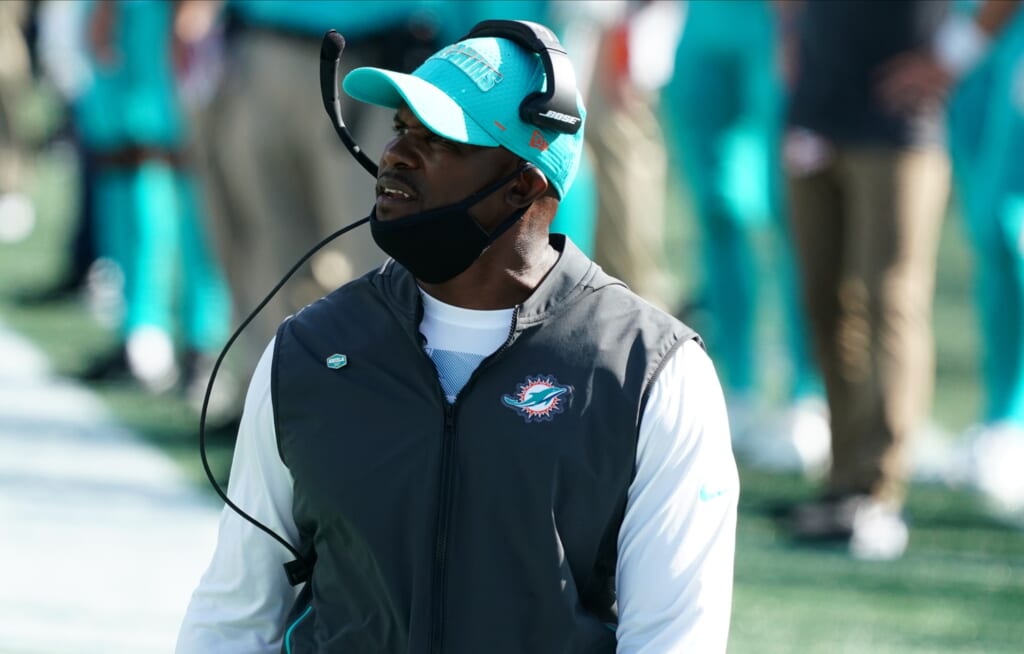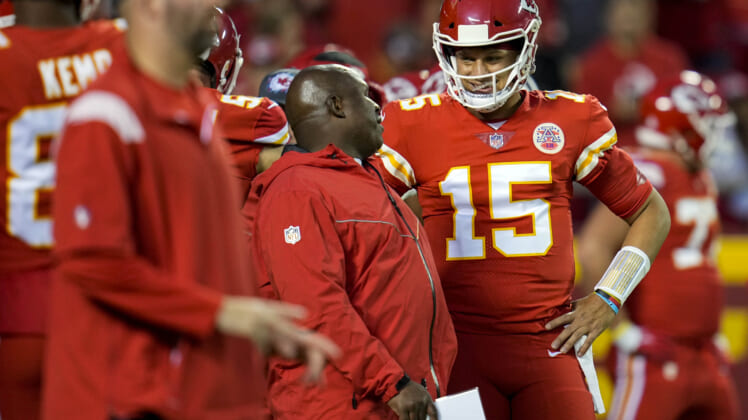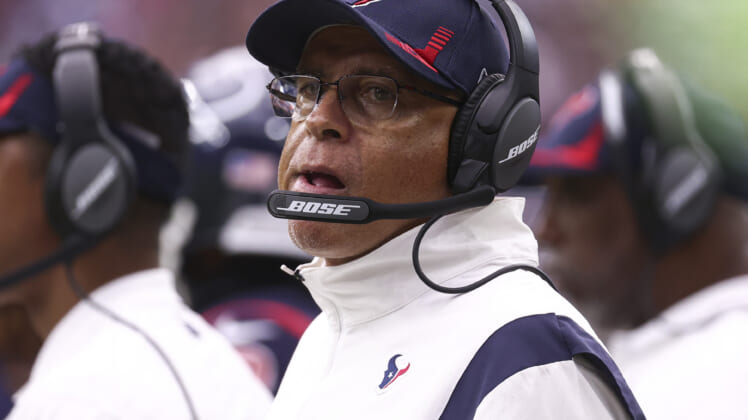In an instant, Brian Flores ended his professional coaching career and just delivered one of the biggest blows the National Football League has received in years. Worse yet for the NFL, this may just be the beginning.
Flores, fired by the Miami Dolphins in January, is suing the NFL and three teams alleging discriminatory hiring practices. While allegations in the 58-page lawsuit filed Tuesday focus on the New York Giants, Denver Broncos and Miami Dolphins, the problems he describes can be seen across the league.
It also could just be the start. Yahoo Sports’ Charles Robinson shared that multiple coaches believe they have evidence to make this a class-action suit. While the NFL is already pushing back, Flores’ allegations and the league’s history suggests teams may be in for a reckoning.
Brian Flores accuses Giants, Broncos of abusing the Rooney Rule

While the NFL has touted the Rooney Rule for years, suggesting it has played a role in the league becoming more diverse, many have always viewed it as a sham. Teams are required to interview one minority candidate before hiring a head coach, but those meetings mean nothing if the organization already knows it is hiring someone else.
In the lawsuit, Flores alleges the Giants conducted a sham interview with him in January, purely conducting it to satisfy the Rooney Rule. Flores claims New York interviewed him on Jan. 18 before the franchise hire Joe Schoen as general manager.
A day after being hired, Schoen finalized Jan. 27 for an interview with Flores. But before that interview happened, Flores says New England Patriots coach Bill Belichick texted him saying he heard from “Buffalo and NYG that you are their guy.” When Flores asked for clarification, asking Belichick if he meant to text him or Brian Daboll, Belichick acknowledged the error and disclosed he heard the Giants wanted Daboll.
But this wasn’t the only time Flores says a team conducted a sham interview with him. In the lawsuit, he claims that when he interviewed for the Denver Broncos head-coaching job in 2019, then-Broncos general manager John Elway and other team executives showed up an hour later and were hungover and believed they were “drinking heavily the night before.”
Flores isn’t alone in believing teams conduct fraudulent interviews with minority candidates, it’s a feeling shared by many of his peers.
The NFL’s hiring and interview process would already be problematic if abusing the Rooney Rule was the only problem. But the league’s history of hiring certain coaches, holding others to a different standard and the NFL’s glass gliff problem are all issues.
Conflicting standards set for coaching candidates

Why isn’t Eric Bieniemy a head coach? It’s a question that is becoming increasingly popular as each hiring cycle passes. We know NFL teams want a brilliant offensive mind who can develop a young quarterback and call plays that creates highlights and lead to victories. In the words of Isiah Thomas, Bieniemy “met the criteria to be selected, but wasn’t.”
Connections matter when it comes to jobs. Just like for football fans, knowing the right person often determines if someone gets hired in the NFL.
The Houston Chronicle’s research found that of the 127 head coach hirings from 2003-’21, there is a diversity imbalance that often results in a white candidate being far more likely to be hired than a Black candidate if neither has a relationship to the current general manager.
Strong ties to the general manager can land an assistant coach an interview for the head-coaching vacancy. For top coaching candidates, it often proves to be an important factor in the final decision.
- Bears’ GM Ryan Poles, HC Matt Eberflus built a strong relationship for years before joining Chicago.
- Giants’ GM Joe Schoen, HC Brian Daboll worked together with the Buffalo Bills
As for the Denver Broncos, Nathaniel Hackett doesn’t have a direct history with general manager George Paton.
There never seems to be a clear answer on why Bieniemy hasn’t been hired as a head coach. One of the most common arguments against him is that he isn’t the primary play-caller. But Andy Reid has stated repeatedly, including on Jan. 27, that Bieniemy calls plays and he fully trusts him to incorporate new ideas into the game plan.
Keep in mind, a coordinator not serving as the primary play-caller isn’t as a roadblock for others. Doug Pederson and Matt Nagy held the same role on Reid’s staff and both became head coaches. Just looking at the current NFL coaches proves this is a barrier that blocks some but not others.
- Denver Broncos coach Nathaniel Hackett: Didn’t call plays in Green Bay, his offenses ranked 18th or worse in yards, points in 5-of-6 seasons from 2013-’18 with Bills and Jaguars.
- Cincinnati Bengals coach Zac Taylor: Rams’ quarterbacks coach (2018), assistant WRs coach (2017)
- Detroit Lions coach Dan Campbell: Saints’ assistant HC, tight ends coach (2016-’20)
- Philadelphia Eagles coach Nick Sirianni: Didn’t serve as primary play-caller for Colts (2018-’20)
It’s understandable why NFL teams give added consideration to candidates who call plays for their offense. But it’s not a direct correlation to success, just ask Reid and Dick Vermeil.
Part of the problem is the lack of minority coaches serving as offensive coordinators. It’s clearly a gateway to receiving interviews and landing on the NFL coaching radar. Bruce Arians, who has the most diverse coaching staff in the NFL with a Black defensive coordinator (Todd Bowles) and offensive coordinator (Byron Leftwich) talks every year about the importance of hiring a great, diverse coaching staff.
San Francisco 49ers head coach Kyle Shanahan is also playing a part with defensive coordinator DeMeco Ryans, promoted after Robert Saleh became a head coach, and offensive coordinator Mike McDaniel. All three of the 49ers’ coordinators are minority coaches.
Bieniemy is one of the rare Black offensive coordinators in football and his resume speaks for itself. But organizations seem to have another issue with him.
NFL insider Benjamin Allbright reported in December 2020 that teams were concerned about Bieniemy’s past legal troubles.
- 1990: Pleaded no contest following accusations of shoving a firefighter who responded to a house fire
- 1991: License suspended for a year following repeated infractions
- 1993: Arrested for allegedly grabbing, harassing a parking lot attendant at Miami-Colorado game. Received one-year campus ban.
- 1998: Arrested for a bar fight and charged with disorderly conduct. Performed mandated community service
- 2001: Arrested on DUI charge
- 2004: Colorado recruiting scandal – Bieniemy linked to allegations Buffaloes’ football program used “alcohol and sex to lure recruits”. Multiple players also faced rape allegations, with Bieniemy called as part of an independent investigation. He was never directly questioned nor was any Colorado staffer found guilty of misconduct.
There are some troubling accusations and incidents there. But a majority of them happened almost two decades ago and wrongful actions by young men or involvement in letting student-athletes get away with things haven’t prevented other head coaches from being hired.
- Tennessee Titans coach Mike Vrabel: Arrested while playing at Ohio State for beating up a man in bar parking lot, served 30 hours of community service. In 2011, arrested for theft from an Indiana casino.
- Former Detroit Lions coach Matt Patricia: Faced sexual assault charges in 1996. Charges dropped in 1997, but multiple witnesses backed the victim’s claims.
- Former Jacksonville Jaguars coach Urban Meyer: As a college coach, 31 player arrests, accused of covering up a racially-charged altercation between assistant coach and player. At Ohio State, Meyer reportedly knew of domestic abuse allegations against assistant Zach Smith in 2015. An Ohio State investigation led to a release of emails and texts that seemed to show Meyer suggesting a strategic leak about Alabama looking into hiring Smith.
NFL teams don’t have an issue with giving second, third, fourth, or fifth chances to players charged with DWI, accused of assault or charged with other serious crimes. They also don’t seem to view a coach’s actions as a young adult as something to hold against them years later. But those standards seem to change when it comes to certain candidates.
These aren’t the only examples of the goalposts being moved. Jim Caldwell posted two double-digit win seasons with the Indianapolis Colts then delivered a winning record (36-28) as the Detroit Lions head coach. He is respected for his work with quarterbacks but keeps getting passed over.
Many assumed Brian Flores would immediately land a job after being fired by the Miami Dolphins despite posting winning records in the last two seasons. But he remains unemployed and the vacancies are all being filled with coordinators with worse resumes than Bieniemy, Flores and Caldwell.
But Flores and Caldwell are also examples of the other problem in the NFL hiring process. When Black coaches are hired, they face the glass cliff issue.
NFL’s Glass Cliff for minority coaches

The glass cliff phenomenon refers to when a member of a minority group rises towards a position of power or leadership in a situation with high risk or failure. Fittingly, the Houston Texans provide the latest example.
Culley took over a team destined for a rebuild. With Deshaun Watson refusing to play, Houston fielded arguably one of the least talented NFL rosters in 2021. Watson’s absence also kept a leader out of the locker room who many players trusted. Somehow, Culley’s Texans found a way to win four games in a year many thought they could go 0-17.
Houston rewarded Culley by firing him. Before he got pushed out the door, leaked reports suggested it was because Culley refused to make changes on offense and some players grew “frustrated with in-game decision and communications issues.” Culley joined a list of head coaches fired after one year, a group that highlights a real problem in the NFL.
NFL head coaches fired after one season (2006-2021):
- David Culley, Houston Texans (2021) – Fired
- Urban Meyer, Jacksonsville Jaguars (2021) – Fired with cause
- Steve Wilks, Arizona Cardinals (2018) – Fired
- Chip Kelly, San Francisco 49ers (2016) – Second stint as NFL head coach
- Jim Tomsula, San Francisco 49ers (2015) – Fired
- Rob Chudzinski, Cleveland Browns (2013) – Fired
- Mike Mularkey, Jacksonville Jaguars (2012) – Second stint as NFL head coach
- Hue Jackson, Oakland Raiders (2011) – Fired
- Jim Mora, Seattle Seahawks (2009) – Fired
- Bobby Petrino, Atlanta Falcons (3-10) – Left after 13 games for Arkansas job
- Cam Cameron, Miami Dolphins (1-15) – Fired
- Art Shell, Oakland Raiders (2-14) – Fired
Two of the last four coaches fired after one season are Black. Keep in mind, Jacksonville fired Urban Meyer only after allegations emerged of him kicking a player and demeaning his coaching staff regularly. Meanwhile, Kelly’s termination came after a stint with the Philadelphia Eagles.
Dating back even further, Black coaches account for 40% of the 10 coaches fired based on their record after one season. Notably, Kelly and Mike Mularkey both previously served as head coaches for a prior team.
The NFL had seven Black head coaches in 2011, an improvement after facing years of criticisms for a lack of representation among leadership. But even with changes to the Rooney Rule and the league pushing for more inclusivity, we enter February with only one Black head coach (Mike Tomlin) and two minority coaches (New York Jets’ Robert Saleh and Washington’s Ron Rivera).
While it’s true that head-coaching vacancies happen because a team finishes near the bottom of the NFL standings, there is a deeper issue. On the rare occasion minority coaching candidates finally get a shot, after being passed over for other jobs, they often have to settle for taking the worst jobs available. It happened to Flores, Culley and Rivera in Washington. If they fail, which is likelier to happen because of what they inherited, they’re pushed out the door and don’t get a second chance.
The NFL went into the 2021 season with three Black head coaches and left with one. In an offseason with nine coaching vacancies, five were filled by white coaches and more will come. Enhancing the Rooney Rule did nothing to help, especially when teams abuse it, the root issues are still there.
As long as teams keep changing the hiring standards for different candidates and treating interviews for Black coaches like they are a burden, the NFL’s problems won’t go away.



